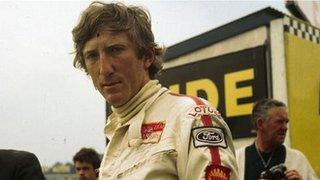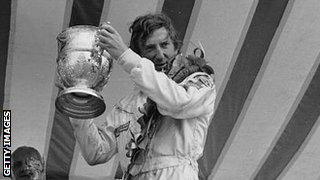Formula 1’s greatest drivers. Number 20: Jochen Rindt
- Published
F1's greatest drivers - Jochen Rindt
BBC Sport is profiling 20 of the greatest Formula 1 drivers of all time. The BBC F1 team were asked to provide their own personal top 20s, which were combined to produce a BBC list.
Chief F1 writer Andrew Benson profiles number 20, Jochen Rindt - while Murray Walker gives his own recollections in the video above.
Throughout Formula 1 history, there have been drivers who, through ability and charisma, have left an impression that transcends their limited results. Jochen Rindt, number 20 on BBC F1's list of the greatest drivers of all time, is one such man.
The Austrian with the boxer's nose is chiefly remembered for being F1's first - and so far only - posthumous world champion. Killed in a crash during practice for the 1970 Italian Grand Prix, he was not crowned until the following month, after his rivals failed to beat his points total from the season's remaining races.
But Rindt was so much more than that - he was one of the most flamboyant and exciting drivers in the history of the sport.
His brusque, typically Austrian manner - not unlike that of his countryman Niki Lauda - meant some thought him arrogant. But to those close to him - including his wife, Nina, a Finnish model - Rindt was funny, generous and kind.
He is renowned as one of the most aggressive drivers, with a wild and exciting style, famous for his car control. But like Gilles Villeneuve a decade later, this came about from a career spent largely in uncompetitive cars - which he needed to wring the neck of to go fast.
In fact, like Villeneuve, Rindt was one of the fairest and cleanest drivers of his time, and when he got into better cars, his driving became increasingly smooth.
Nevertheless, what marked him out was his ability to create moments that took the breath away. One such was at the wet Silverstone International Trophy in 1969.
Rindt was making up ground after being delayed by an earlier engine problem, which then cleared.
Heading on one lap into Stowe Corner - then a super-fast bend that tested the very best - Rindt was closing on Piers Courage and Jacky Ickx, who themselves were coming up to lap Pedro Rodriguez and Graham Hill. When they turned into the corner, Rindt was at the back of the five cars; when they came out, he was at the front.
It was, say those who were there, one of those moments that makes you doubt what you have seen.
The British Grand Prix that year, also at Silverstone, was another highlight. Rindt and Jackie Stewart staged one of the greatest races there has ever been.
Swapping places for lap after lap, sometimes several times a lap, they disputed the lead, running at record speeds despite the intensity of their duel. Only when Rindt's Lotus ran into problems did the battle break up.
"It was a fantastic battle," Stewart remembers, "yet full of good humour. Occasionally we'd go through Becketts or somewhere side by side, neither of us willing to give way, yet taking care always to give the other fellow room. And we'd come out of the corner and look across at each other."

Jochen Rindt was F1's only posthumous world champion
Few of his contemporaries doubted that Rindt was the quickest driver of his time - at least once Jim Clark was killed early in 1968.
Yet he had to wait four years after his debut in 1965 with Cooper to win his first grand prix, saddled as he was with cars that were off the pace and, often, unreliable. That meant he had to forge his reputation against the likes of Stewart, Clark and Hill in Formula 2, in an era when F1 drivers also raced in the lower category.
Rindt's fortunes changed when he joined Lotus in 1969. He moved there because he wanted a winning car but it was not an easy decision, for he did not trust the integrity of the designs of the legendary team boss Colin Chapman.
There was no doubt about the speed of Chapman's cars - but it was a speed based often on paring things to the bone, and as a result they tended to break a lot as well.
Rindt was effectively a replacement for Clark, the greatest driver of the era, who had been killed in a Lotus in a Formula 2 race at Hockenheim the year before Rindt joined the team.
Chapman had been very close to Clark, but he always had a frosty relationship with Rindt.
This was not helped in their first season together when the notorious high rear wing failed on Rindt's car during the Spanish Grand Prix on the fast Montjuic circuit in Barcelona. He was lucky to escape serious injury when his car overturned after hitting the wreckage of team-mate Hill's car, which had earlier suffered the same failure in exactly the same place.
Likewise, in 1970, Rindt initially distrusted Chapman's new Lotus 72, and it was in the older 49 that he took his first win that season - chasing down Jack Brabham in the closing laps of Monaco in stunning style and pressuring the veteran Australian into crashing at the last corner of the last lap.
Eventually, Rindt came to accept the 72 and, after a run of four wins, that summer he arrived at the Italian GP on the brink of the world title.
But again there was a dispute with Chapman. Rindt had wanted to race the 49 at Monza, thinking it would be better suited to the fast track, then without the chicanes of its modern format. But when he got there, there were three 72s, and Chapman told him to get on with it.
There was further controversy when Chapman took off the car's wings in the pursuit of straight-line speed.
In that specification the car was very difficult to drive, to the point that it completely spooked third driver John Miles. Then, in Saturday practice, Rindt's car veered suddenly left approaching the Parabolica, one of the fastest parts of the track, and crashed into the wall, probably because of a rear suspension failure.
Rindt, not wearing a crotch strap, 'submarined' in the cockpit and suffered unsurvivable throat injuries caused by the seat-belt buckle.

Rindt won the British Grand Prix in 1970
There was talk at the time that he might have been planning to retire at the end of the season. But The Independent's F1 correspondent David Tremayne, who has written an exhaustively researched biography, believes Rindt would have continued for another year with Lotus, before joining forces with his manager Bernie Ecclestone to set up their own team.
How good was he?
Jackie Stewart and Jim Clark, as you will see, have places much higher on this list. Yet Rindt could run with them on an equal basis and beat them on his day. And Stewart, the only surviving member of the trio, still has the utmost respect for him. That says it all.